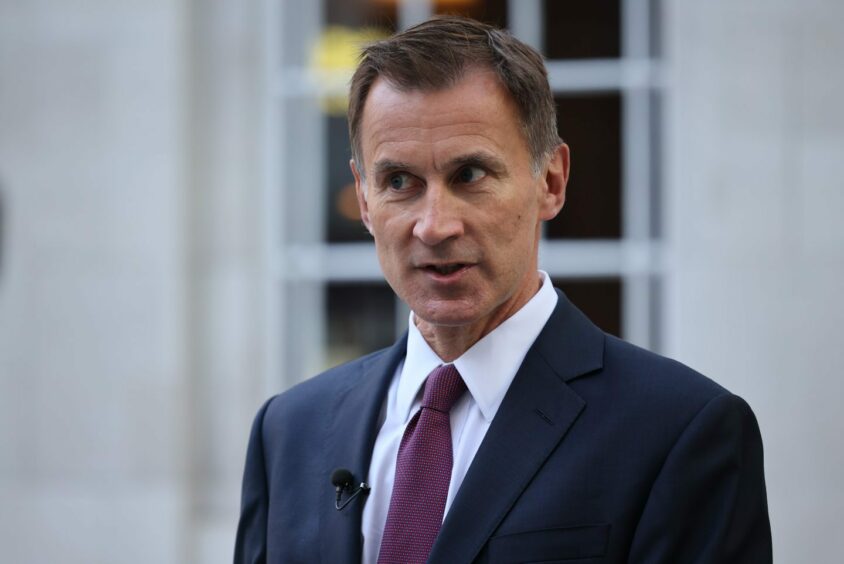
Electricity generators and North Sea oil firms are to be hit by a £54bn windfall tax under plans unveiled today, which the industry said “threatens to drive investment out of the UK altogether”.
In the Autumn Budget, chancellor Jeremy Hunt hiked the oil and gas windfall tax by 10% – to a total of 35% – expected to pay out £40bn to the Treasury by 2028.
Meanwhile electricity generators are facing a 45% tax rate, expected to raise £14.2bn over the next six years.
Oil and gas firms will now pay 75% total on profits through to 2028 – the new “sunset clause” for the Energy Profits Levy (EPL) – even if oil prices fall.
It builds on the original EPL, implemented by then-chancellor Rishi Sunak in May, which set a 65% overall tax rate on the industry.
Tax will impact ‘hundreds of companies’
The new tax includes an effective “subsidy” for electrification of oil and gas platforms, but this doesn’t go enough to protect the industry, according to the leading trade body.
Offshore Energies UK (OEUK) said the tax changes would impact “not just North Sea operators but the hundreds of other companies in their supply chains, operating in towns and cities across the UK”.
Chief executive Deirdre Michie said: “This rate is so high that it threatens to drive investment out of the UK altogether. The extension to 2028 takes no account of the likelihood of prices falling in that time. It’s also worrying that we are increasing taxes on low-carbon electricity generation like offshore wind.
“But it’s not just the rate that is so damaging. It’s also the disruption and uncertainty generated by constant changes to our tax system.
“No industry can invest or plan without knowing what kinds of tax regime will be in place. We want to work with the government to build a long-term tax regime that will let us play a full role in the energy transition.”
Ms Michie says the industry is proud to pay its taxes, but a “balance” has to be struck.
According to the Office for Budget Responsibility (OBR), its forecast for oil and gas receipts have now doubled since its March estimate for 2022-23 (to £14.9 billion) and more than quadrupled in 2023-24 (to £20.7 billion, including £10.8 billion of EPL revenues).
Unveiling the tax, Jeremy Hunt said he supports a windfall tax but “any such tax should be temporary, not deter investment, and recognise the cyclical nature of energy businesses”.
North Sea electrification ‘subsidy’
There is, however, one sweetener in the updated levy linked to decarbonising oil and gas platforms via clean electricity.
The original windfall tax on North Sea firms included an 80% investment allowance which, combined with other measures, meant firms got £91.25 back per £100 spent for oil and gas projects.
Under the new, higher rate of tax at 35%, companies will now be able to claim £91.40 for every £100 invested, rather than the previous £91.25.
For electrification it now goes further – meaning firms spending £100 on decarbonisation will receive £109.25 back.
Professor Alex Kemp, petroleum economist at Aberdeen University, said: “There’s a superdeduction for that and is kept at an extremely high rate, which means there is a bit of a subsidy here.
“But that could be justified on the wider grounds of getting emissions down.”
Platform electrification is a waste of capital that could be spent on projects that will have a genuine benefit for energy decarbonisation. It's pure greenwash.
— Dick Winchester 🏴 (@DickWinchester) November 17, 2022
It should go some way to ensuring firms can reach crucial North Sea decarbonisation goals – a 50% cut in emissions by 2030.
Other effects?
Professor Kemp said that, like the original EPL, the impact will depend on the position of investors; if they’ve got an investment pipeline ahead, then they may be insulated, but they could be adversely affected if not.
“The question is whether these higher rates will have a negative affect on investment, because it takes more of the cash flows away and, by definition, leaves less available for investment.
“It also means the return on a new investment in the North Sea is reduced a bit.”
He also pointed to an impact on decommissioning in the sector.
“The other issue which is noteworthy is the fact that decommissioning costs are not deductible for purposes of the windfall tax.
“A consequence of that is, if cash flows are being squeezed, then the last item a company would spend on would be decommissioning – so decommissioning could be postponed.”
£80bn cash grab
Ryan Crighton, policy director at the Aberdeen and Grampian Chamber of Commerce, said: “It has become impossible to keep up with what this government wants from the energy sector.
“Does it want to increase energy security and accelerate the UK’s path to net zero? Or does it simply want to use the North Sea as a cash cow? Today’s £80billion tax raid sends a clear signal that it is the latter.”
Mr Crighton said the investment allowance linked to the tax should have gone further for low carbon and renewables projects.
“The Chancellor has ignored explicit warnings from some of the North Sea’s most experienced figures that a 75% tax rate will force them to invest elsewhere. And he has also failed to extend the Investment Allowance to low carbon technologies like hydrogen and offshore wind farms, a move which could have turbo-charged the energy transition here.”
What about electricity generators?
The electricity market is structured in such a way that the price of electricity is tied to the price of gas.
Although plans are underway to reform this, many generators are seeing “extraordinary returns” due to high gas prices.
The Treasury said its so-called “Electricity Generators Levy” will ensure generators “pay their fair share”, the government said, towards supporting households.
The levy is being placed at a temporary 45% rate on “extraordinary profits” – defined as electricity sold above £75 per megawatt hour (MWh), around 1.5 times the average price of electricity over the last decade.
Combined with corporation tax, that brings the headline rate on earnings to 70%.
The energy profits levy (windfall tax) rate is rising, & will be put on electricity generators to raise £14bn
(Which is roughly what it'd cost if the energy price guarantee were to carry on and be set at the 20% higher rate than currently – watch this space)#AutumnStatement— Martin Lewis (@MartinSLewis) November 17, 2022
The Electricity Generators Levy differs to the oil and gas windfall tax in that it only applies to profits above £75MWh, whereas the EPL applies to all profits.
Therefore, the rate is being set higher than the 35% on oil and gas.
It also differs in that there is no investment incentive linked to it.
Level playing-field needed
Dan McGrail, CEO of trade body RenewableUK said it risks damaging investment in “vital projects”.
“Any new tax should have focussed on large, unexpected windfalls right across the energy sector, instead profits at fossil fuel plants are inexplicably exempted from the levy. Many renewable generators are on long-term, fixed price contracts and most other sold their power for this winter over a year ago, so they haven’t been making excess profits.
“We need to attract more than £175bn in new wind farms and our supply chain over the course of this decade, so we need to make the UK one of the most attractive destinations for private investment in renewables. Ministers now need to work with the industry to ensure that the implementation of these plans ensures a level playing-field, rather than imposing unfair burdens on renewables.
The levy will not apply to electricity generated under a Contract for Difference scheme.
Political backlash to windfall tax incentives
Reacting to the budget, Labour’s shadow chancellor Rachel Reeves lambasted Jeremy Hunt for not going far enough to hit oil and gas.
She said: “After months of resistance from this Prime Minister, the government has finally been dragged, kicking and screaming, to extend the windfall tax that Labour has been calling for since January.
“Yet they still leave millions of pounds on the table – profits that are the windfalls of war – because they have failed to close a huge loophole that they created, that hands out massive tax breaks to oil and gas giants for doing the things that they were going to do anyway.
“For those wondering why some energy giants have no more tax last quarter, despite record profits and eye watering bills for consumers, the answer is the decisions that this Prime Minister made when he was chancellor, confirmed by the current chancellor, lets the energy giants off the hook once again.”
Recommended for you

 © Supplied by HM Treasury
© Supplied by HM Treasury
 © Supplied by AGCC/ Michal Wachuci
© Supplied by AGCC/ Michal Wachuci